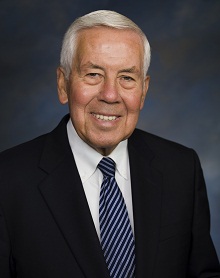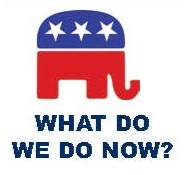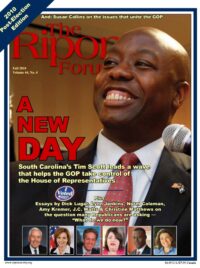

The substantial Republican gains this November present our party with enormous opportunities, and, correspondingly, great responsibilities to an electorate demanding substantial changes in public policy from a Congress that will be responsive to its concerns.
Many analysts attribute the strong Republican trend to the visible anger of millions of Americans discouraged by persistent high unemployment, excessive government spending yielding monumental deficits to be repaid long into the future, and obtrusive federal government interference in business and other ordinary pursuits of life in a free country. Such anger – much of it justified – exists. But those who believe the explanation for what we have just witnessed starts and ends with “anger” are, in my judgment, missing the point.
Among some in Democratic leadership and the media, “anger” is shorthand for dismissing the scope and legitimacy of frustration – which found expression in the Tea Party movement – with the current direction of federal policy. One can find in any popular movement persons who can be characterized (or caricatured) as “angry” or “extreme.” Such labels were attached to Sam Adams (an “original” Tea Partier) along with Patrick Henry and Thomas Paine, none of them a moderate voice in a Revolution that began, after all, as a tax revolt.
But whatever criticisms may be leveled at one or another modern-day Tea Party spokesperson or candidate, it is unfair – and foolish – to view the movement and the over one-third of Americans who say they support its objectives as an irresponsible fringe. The vast majority of such Americans are responsible citizens convinced that federal tax, spending and regulatory policies are fundamentally off-track – so much so that they seriously threaten future prosperity and freedom, requiring ordinary individuals to become actively involved in the political process to set things right. This is how it is supposed to work in a representative system.
Whatever criticisms may be leveled at one or another modern-day Tea Party spokesperson or candidate, it is unfair – and foolish – to view the movement and the over one-third of Americans who say they support its objectives as an irresponsible fringe.
It is also mistaken, in my view, for those who applaud the November election outcome to focus primarily on voter anger. This brings into focus important strategy choices facing the congressional Republicans whose numbers have now dramatically increased.
Even before the election, some Republicans counseled that correcting the country’s course entailed a two-stage process. Stage one has been accomplished with the extraordinary GOP success in 2010 mid-term elections. Stage two requires electing a Republican President in 2012, accompanied by even greater Republican representation in both houses. So far, so good. The strategy choice arises on how best to work towards that second objective.
Some recommend resolute opposition on all fronts to President Obama and his reduced cadre of Democratic congressional cohorts. This could include efforts to repeal or substantially change “Obamacare” and other Administration legislative and regulatory policies to date, even knowing such efforts would face Presidential vetoes that would be upheld by remaining congressional Democrats. This course, some argue, will cause public anger against the President and his legislative allies to continue to intensify, making more likely an overwhelming Republican victory in 2012. Furthermore, they caution that even attempting to advocate specific Republican proposals, much less attempting to adopt them, risks courting opposition from individuals and groups who might be affected by such reforms – and that debate within Republican ranks over particular reform ideas would weaken the overall thrust of GOP unity based on anger arising from public rejection of President Obama’s agenda.
I respectfully disagree with a “just say no” approach that excludes advancing serious Republican proposals for constructive tax, spending and regulatory reforms. Opposing unsound Administration policies remains important. Votes to repeal programs rejected by most voters, even if repeal will be vetoed, can underscore where Republicans stand on vital issues. Other steps – such as refusing to appropriate funds for aspects of such programs – may have practical impact even before the next election.
But simple, unadorned “opposition” is mistaken, from both the policy and political perspectives. Voters, including those who associate with the Tea Party movement, want their representatives to pursue responsible policies that comport with our traditions of political and economic freedom. This is why I believe the best course for congressional Republicans is to attempt to outline and meet some very important challenges to the overall strength of our Nation and its role in the world, and to do so with far-sighted vigor and enthusiasm.
…simple, unadorned “opposition” is mistaken, from both the policy and political perspectives.
Objective number one must be to build public optimism that our economy is going to grow much stronger, and that this growth will bring about more confidence to invest in new products and services that will create more jobs, and enhance our country’s ability to compete with economies of other countries around the globe. On another occasion of economic challenge, President Ronald Reagan called for “morning in America,” a great new dawn of vigorous enterprise and adventure. Now as then, providing a new day of opportunity requires that we end for all Americans the threat of higher income taxes. We may introduce legislation to make our tax code less complex, and may examine very carefully various tax breaks for particular individuals and interests that have worked their way into the tax code. But it is vital that we immediately restore certainty and stability to both business and private investment decisions by ending now the threat of higher individual tax rates.
Second, we must reduce federal spending by instituting careful analysis of the largest areas of expenditure that have the most promise for identifying present and future savings. This includes backing Pentagon budget reforms proposed by Defense Secretary Robert Gates. The Secretary has courageously taken on a host of interests in the military-industrial complex (first so identified by President Eisenhower), demanding major management improvements and cutback in particular weapons systems, while encouraging our allies to assume some responsibilities we have shouldered in the defense of civilized values and the quest for global peace and stability.
Third, we must make responsible proposals for entitlement reforms, an area even more controversial than proposed reductions in defense spending. Many argue that even discussing changes in Social Security, Medicare and Medicaid benefits endangers Republicans in seeking continued public support for a reform agenda. This is the view that sees Americans, as some have put it, as rhetorically conservative but operationally liberal when it comes to government benefits they expect to receive. I believe this cynical characterization is underestimating the citizens who overwhelmingly backed Republican candidates this November.
Most Americans understand than any honest, realistic effort to get control of government spending simply must address the areas where spending growth has been monumental – namely, defense and entitlements. These Americans likewise celebrate that we now have substantial possibilities for living longer and more productive lives, and recognize that pension and health support plans must take greater longevity into account if such plans are to survive. I believe most Americans will in fact respect and support Republicans for candidly addressing these challenges, notwithstanding predictable demagoguery this will engender from some.
Most Americans understand than any honest, realistic effort to get control of government spending simply must address the areas where spending growth has been monumental – namely, defense and entitlements.
A host of other areas will also benefit from responsible Republican suggestions. As one example, I have long advocated ending various New Deal-era crop subsidy programs, and substituting a form of whole farm income insurance as a more practical and equitable policy. Republicans with leadership experience in other fields should advance similar reforms, grounded in national and international realities of 2010 as opposed to the 1930s or World War II periods that spawned scores of “emergency solutions” that yet survive.
Republicans should also once again champion our international interests. Bilateral trade agreements with South Korea, Colombia and Panama have long been on the table; they merit our strong support. We should take the lead in encouraging American exports and ideals around the world. We should accelerate opportunities for foreign students to study in our universities and American students to study abroad, creating better-informed business and political leaders in the future. Republicans know our country remains the strongest economic competitor.
A vital example is American agriculture, where corn, wheat and soybean exports – boosted by incorporating scientific advances in production and distribution of our crops – find valuable markets abroad while providing a humane safety net for countless thousands around the world. We should support educational reforms, as well as tax and other economic policies, that enhance our competitive position – including making American companies more attractive investment vehicles for international capital – rather than “hunkering down” with high tariff and other protectionist policies rooted in fear of international competition in which we in fact can thrive.
In these and other areas, congressional Republicans have an historic opportunity to take the lead in moving our country towards constructive solutions vital to its long-term strength and prosperity. I believe Americans are prepared and indeed eager, as perhaps never before, for leaders who will responsibly address difficult challenges, rather than ducking controversial issues out of fear of the political repercussions.
Independent voters and indeed, a great many persons from traditional Democratic backgrounds will be encouraged by this approach, and will join Republicans in supporting our courageous and visionary leadership. Let’s not disappoint them.
Dick Lugar is the Senior United States Senator from the State of Indiana.




